
Alternative Lifestyles Which Allow You to Travel and Stay Close to Nature
Home may be where the heart is, but most of us still need a physical place to live a convenient and practical life. Or at least we think we do. However, some people have an outside the box approach to the concept of home (literally and metaphorically), which allows them to find creative, more fulfilling ways to live their lives. These 'alternative lifestyles' can give a person so much freedom and endless opportunities to travel, plus a chance to create a special bond with nature. From van dwelling to canal boats, there are several 'unconventional' housing options, and they can be as permanent or temporary as you would like them to be.
For many young couples and families, the thought of having a movable home means focusing on experiences instead of possessions, learning to live with less to gain more. But, for an increasing number of people, this new trend of living off the grid is more than just a breath of fresh air. It's a necessity. According to research, "about 40% of young adults in the UK can't afford to buy one of the cheapest homes in their area". Renting is not any better, with rent cost often eating up most of their monthly income. So, in search of affordability and liberation of the conventional lifestyle, we see more and more people joining the van life, boat life and tiny house movement.
Although alternative living is not for everyone, ask anyone who has tried it, and they will likely tell you that the advantages far outweigh any negatives. That's certainly not enough to convince anyone to give it a go, so read through the most popular forms of alternative lifestyles that involve travelling and being connected to the outdoors, and maybe you'll be able to form a stronger opinion on the matter, either way.
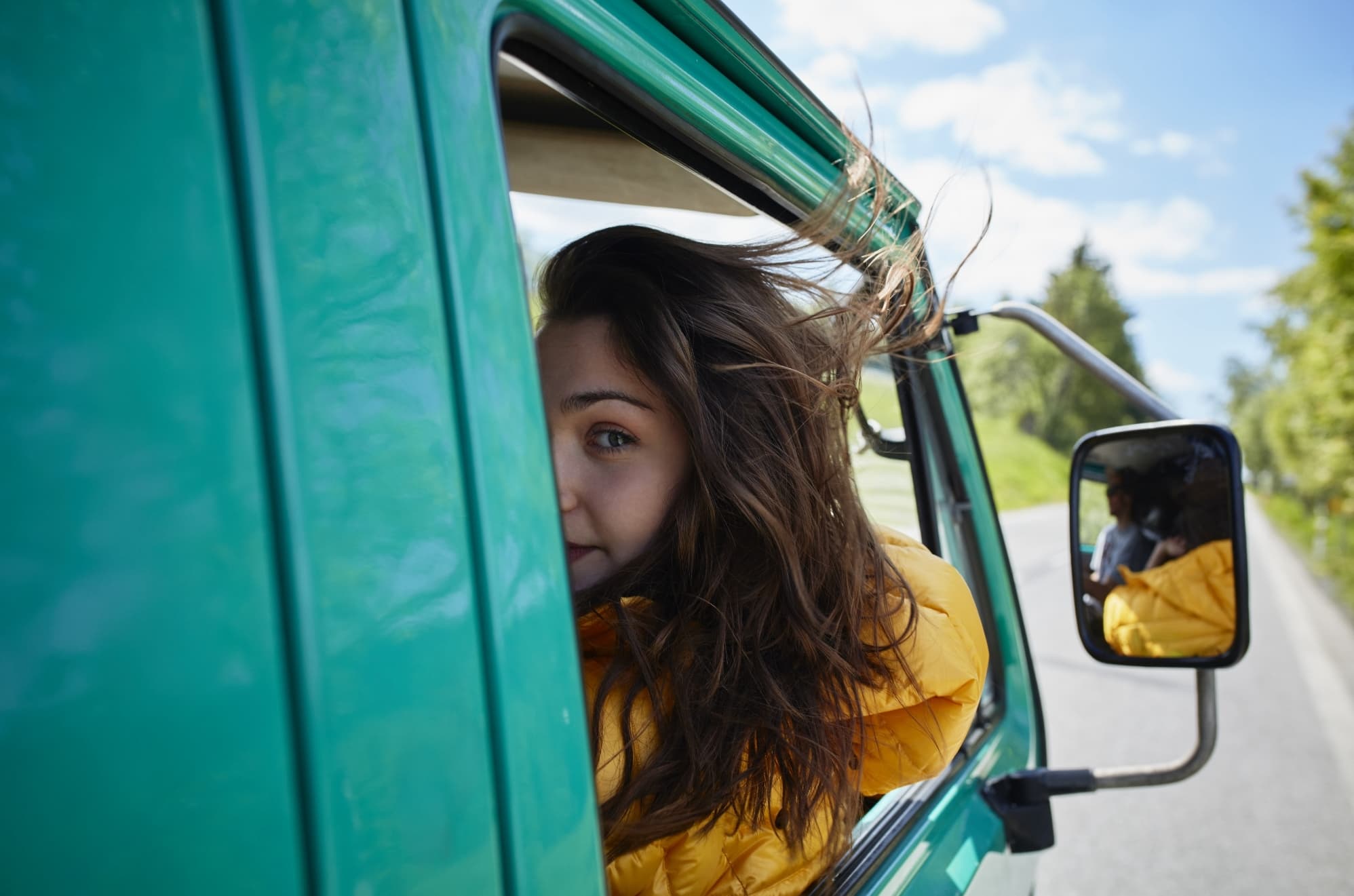
- Featured accommodation
Van life
If you are looking for a more adventurous way of life, always want to be at one with the outdoors, and highly value freedom and spontaneity, maybe you can consider living in a van. The advantages are undeniable: you get to travel the world, meet new people and wake up to a different view every morning. On top, no rent pay, no 9 to 5 job, no one day the same as the other. It's the ultimate liberation of the 'norm' that many of us long for, but just the brave ones go and take the chance.
We see the idyllic lifestyles of the vanlifers across the social media channels, showing their personality through their distinct stylish van interiors, and it inevitably makes us think if we could ever do it. Could we? We are used to having all sorts of things that fill our cupboards and wardrobes, that it's hard to imagine how much we could downsize. How much would be enough? Do we really need 10 pairs of shoes each? Full set of pans and pots and tins? 70-inch TVs.
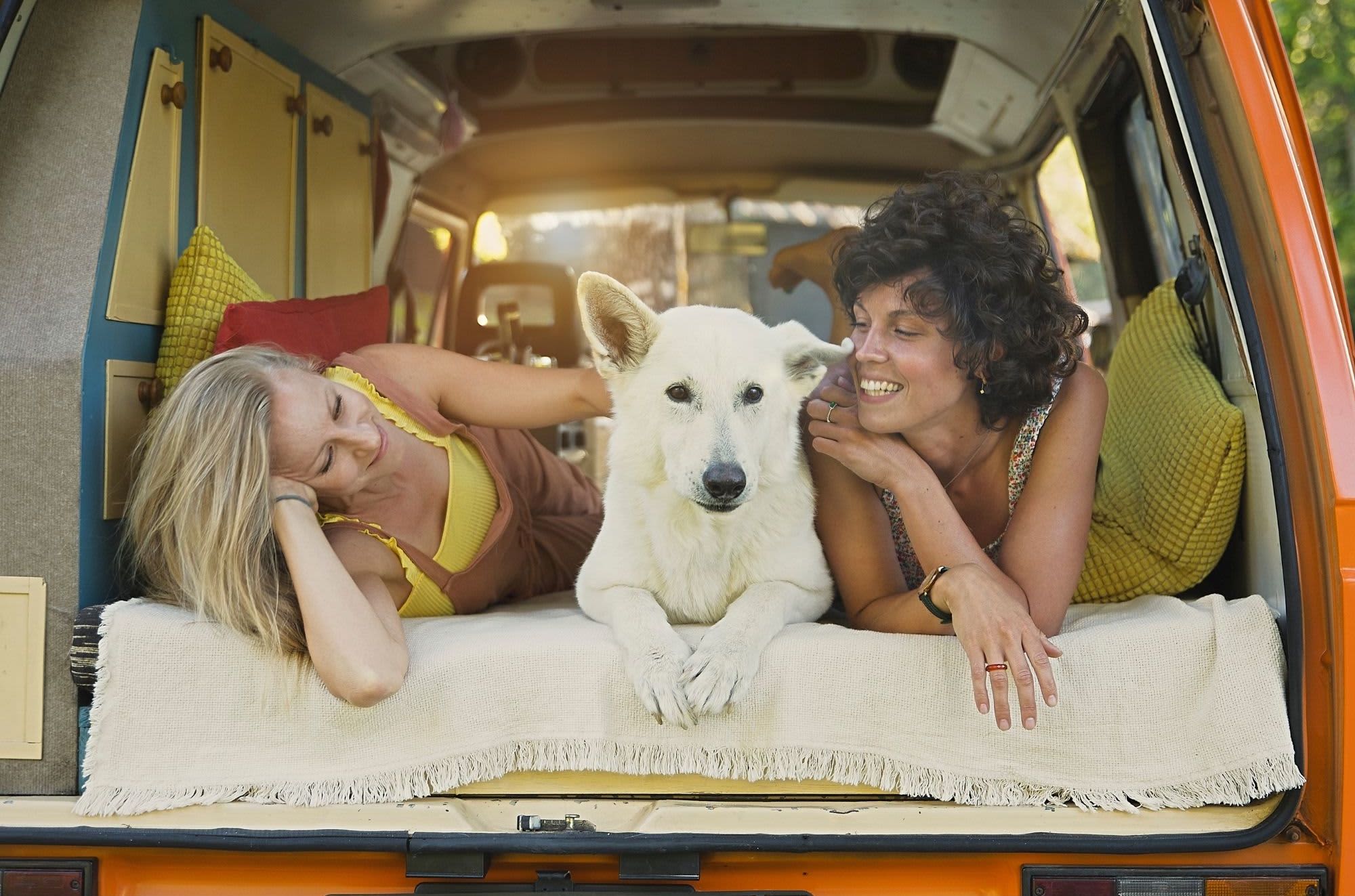
- Featured accommodation
Vanlifers understand there's more to life than material possessions, so they accept to live a minimalist lifestyle in exchange for endless new experiences. But, there's another side to this lifestyle. First, the most obvious issue can be the tiny space itself. You have to be prepared to live with the same individual(s) the whole time in a limited space. Showering and toilet may be available (usually at the cost of something else), though using them would be at any rate, well... alternative. Parking is another thing that vanlifers have to think of daily and spend a lot of time on. Apps like Park4Night can help a great deal with this and, of course, the good old Google.
Compromising comfort for convenience is one way to go about van dwelling. But, if you need more space and you are up for a DIY challenge, you can consider an old bus or double-decker. We have seen many creative people who have managed to convert vehicles of all sizes and shapes into beautiful personal mobile homes, adapted to their living needs. YouTuber David Coward has been living and travelling in an old ambulance he had bought on eBay for £800.
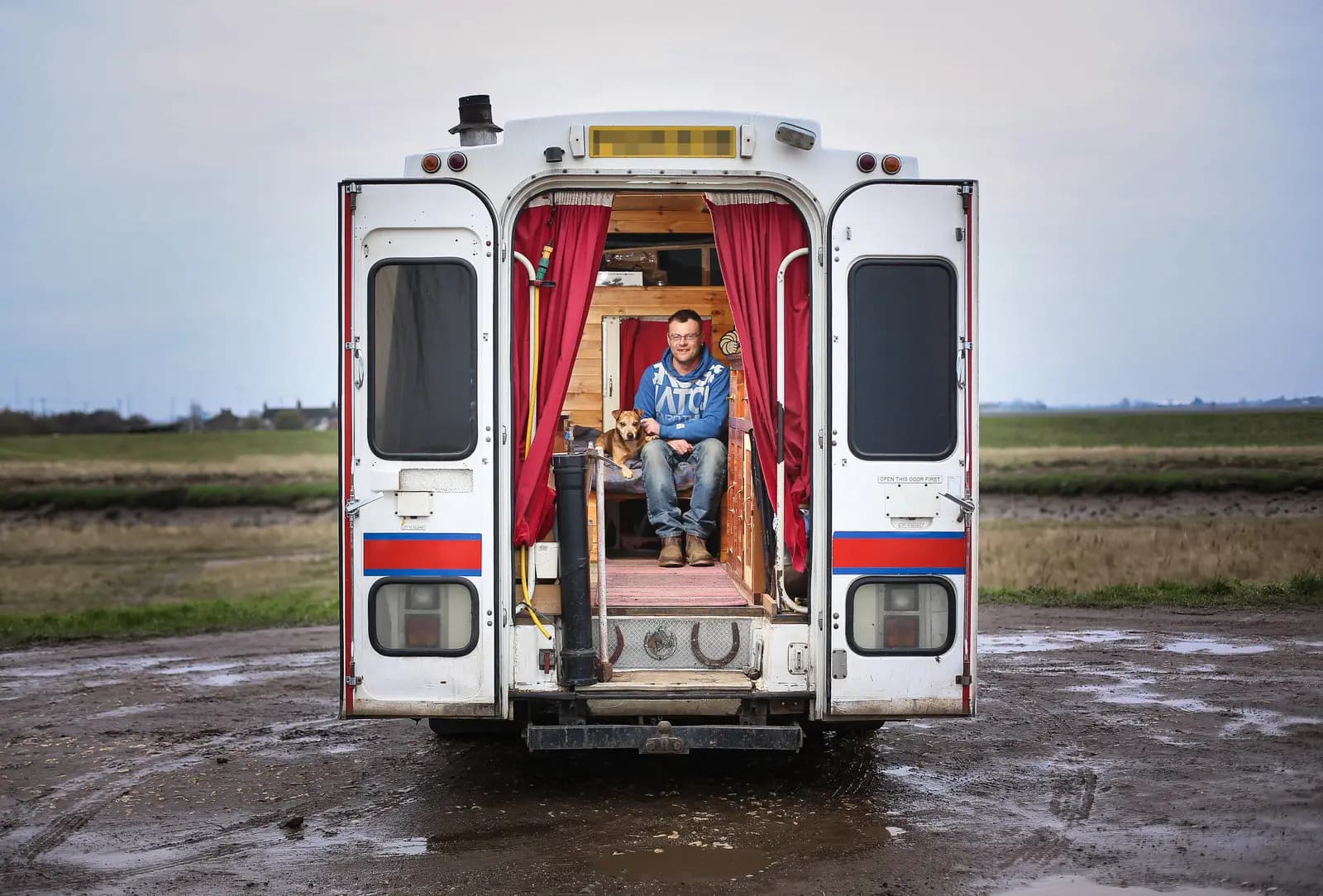
- Featured accommodation
Source: Thomas Maddick / SWNS for BuzzFeed News
It may seem daunting to start the #vanlife journey, and there are many things to consider before (conversion costs and the time it takes for one!). But, if your job allows you to work remotely and there isn't anything tying you to a specific location, going for van dwelling might be a great way to bring a little adventure into your life and save money in the process. It's also worth mentioning that there's a friendly community of fellow van dwellers out there, so whatever you need to figure out, you can count on a lot of support and sincere advice.
We reached out to Libby and Constantinos, who are the creators of the Instagram profile @vw_travellers, where they share their van adventures. They started their van life journey with their van Mollie in February 2020 and have had some fantastic experiences since. Now they can't wait to be able to continue travelling and visiting more amazing places.
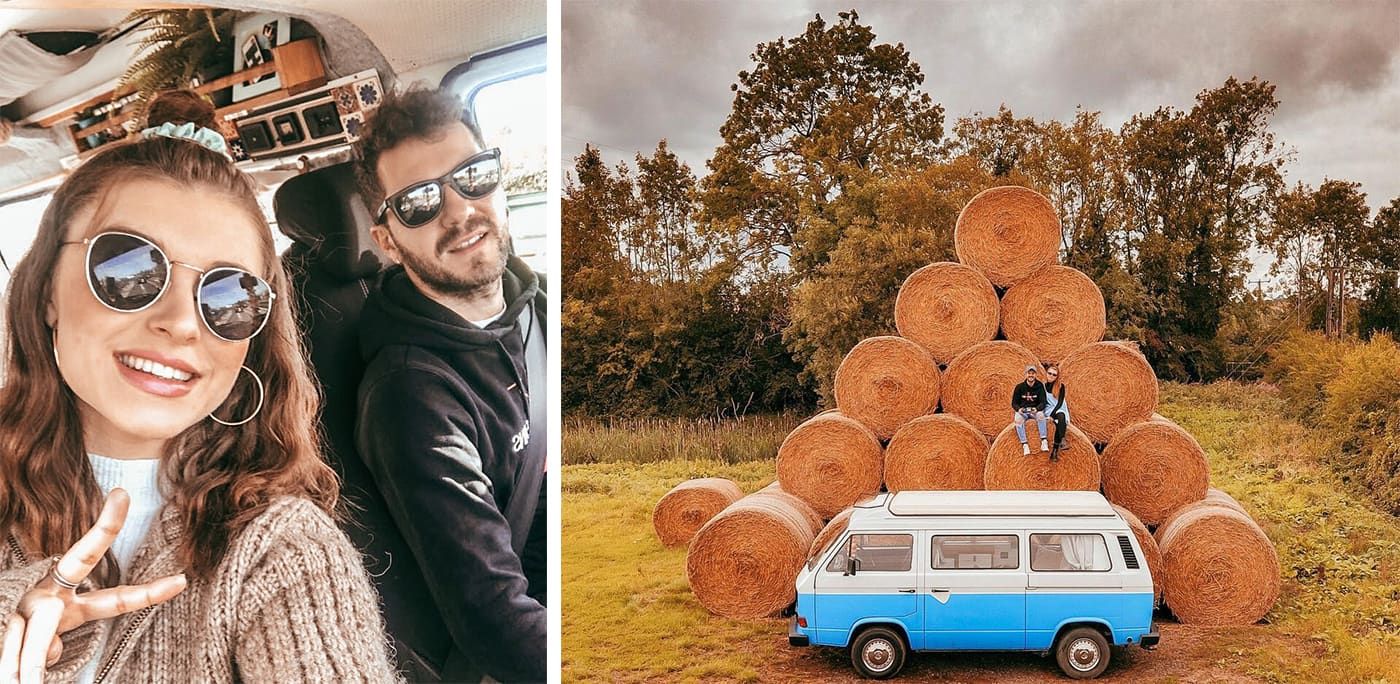
- Featured accommodation
Source: https://www.instagram.com/vw_travellers/
"We bought Mollie just before the first lockdown and spent about 3 months making the van roadworthy! Now it's nearly been a year, and we are working on perfecting Mollie, prepping for summer adventures. 🤞🏻 Mollie has honestly been such a lifesaver during this pandemic as we have had a positive focus and a project to do together. We have managed to squeeze in small escapes to different parts of the UK when lockdown was eased throughout 2020. Mollie has been so much fun, and we cannot wait to go travelling in the van when COVID calms down and see what opportunities and adventures await!"
Boat life
Water is the new land for over 15,000 people who live afloat full-time on the rivers, canals and coastlines of the UK (the number is probably much higher as the stats are a few years old). Boatlifers are incited to go live on the water mainly for the same reasons as those choosing a house on wheels - the almost impossible costs of owning a place and the possibility of having a more adventurous lifestyle that involves exploring new locations and enjoying sensational views.

- Featured accommodation
When it comes to their style and size, various options are available, from narrow canal boats and houseboats to yachts. Canal boats are great for people who don't mind the simplistic way of life and appreciate this lifestyle's romantic notion. They're usually more spacious than vans, cosier and can have wood burners and rooftop gardens. On the flip side, there are mooring fees and an obligation to move every two weeks, unless you get a permanent mooring, which is quite expensive.
Boat owners also have to worry about finding a mooring place in, often, very cramped areas. Emptying toilets (if any), filling up tanks with water, and providing electricity and fuel are just a few other boaters' hardships. Still, the possibility to leave anywhere and take your house with you sounds pretty fantastic. Skip packing and chasing after trains or planes, start the engine and just sail away.
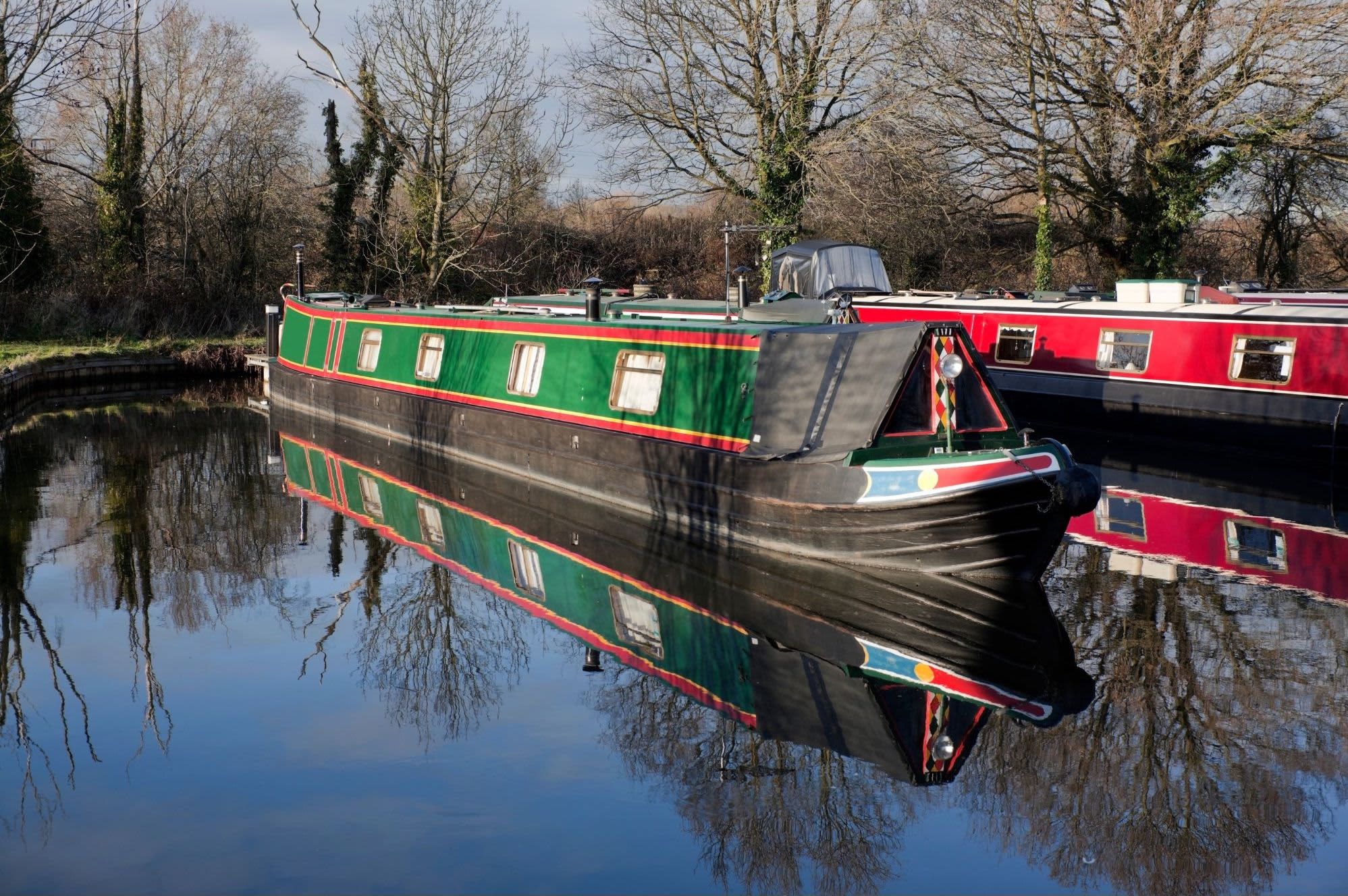
- Featured accommodation
Converting a boat, as well as other alternative living spaces, allows you to unleash your creativity and make your home stylish and unique. That can be an exciting project, and once you see what some people have done, you might ask yourself: Why am I still living on the ground?
One of those boat conversion projects that caught our eye is Cristina and Rohan's. Like many, they were provoked by the London housing crisis, so they decided to do something really unorthodox - buy a 1960s cargo barge and make it their home. They purchased the vessel from Belgium, which cost them about £100,000, and 20 months later, they converted it into a stunning two-storey floating home.
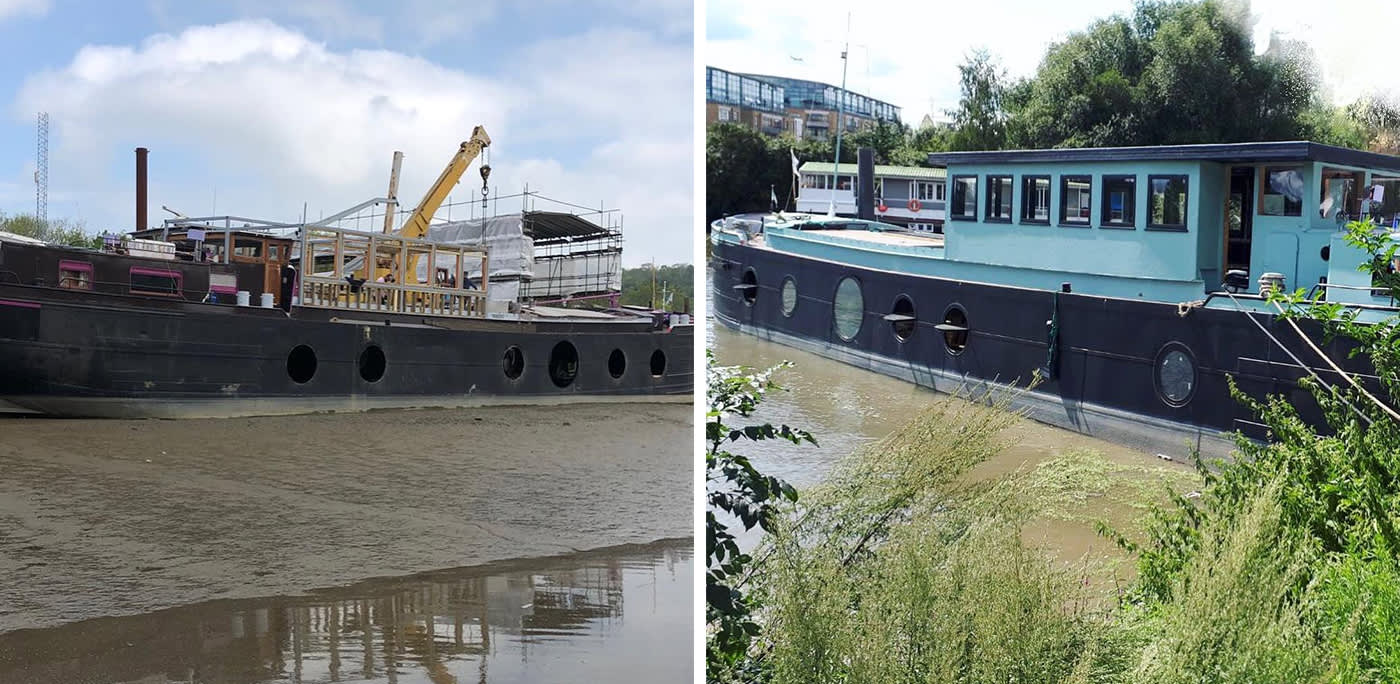
- Featured accommodation
Source: https://www.instagram.com/thisonefloats/
The whole idea came after joking about living on a boat while on a riverside walk. But as much as it all sounds spontaneous and exciting, they admit working on the boat had been very stressful. They had to give up their rental property in Paddington and move 7 times while the boat's work was being done. During this time, Christina was breastfeeding and caring for their newborn daughter Elara.
Well, it seems Christina and Rohan's work and sacrifices had paid off because they ended up having this beautiful three-bedroom, two-and-a-half bathroom home with stylish interiors. They have 10 porthole windows on the boat's sides, giving them a lot of natural light and allowing them to enjoy the wildlife, paddle-boarders and rowers gliding along the River Thames. The kitchen's glass doors open up to the gorgeous deck with a walk-on glass skylight, which looks to the downstairs lounge and dining area. Ahhh, what a way to live!
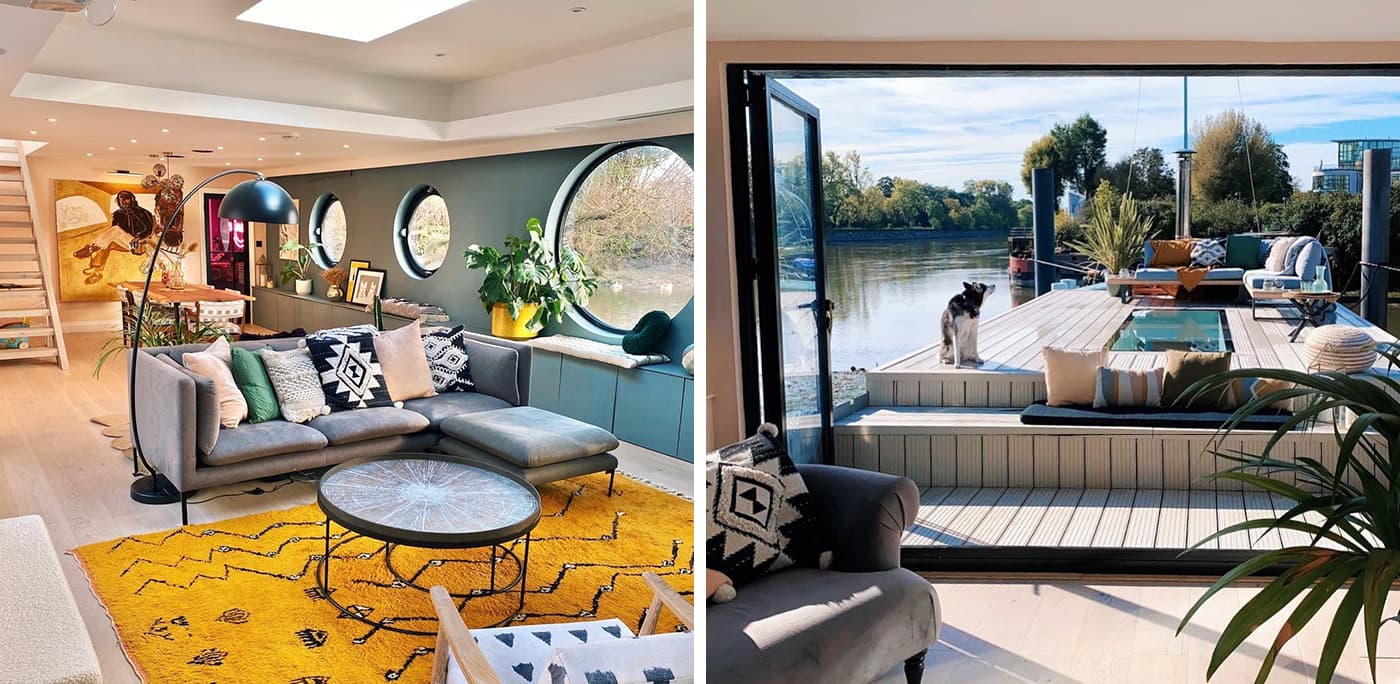
- Featured accommodation
Source: https://www.instagram.com/thisonefloats/
Tiny House Movement
First appearing in the US, tiny houses have quickly become a global phenomenon and one of the most desired forms of alternative living. As their name suggests, these are proper houses (just much cuter), except they're tiny. They can be built on a wheelbase and relatively easily moved to a different location. So, if you need a change of scenery, you can just move your house further down the road.
Tiny houses are designed with sustainability and affordability in mind. They encourage a shift in modern life from consumerism to minimalism. Apart from looking very attractive, they are more compact, energy-efficient, environmentally friendly and easier to maintain. But, just because they're small, it doesn't mean they lack comfort and luxury. They vary in size and type and can be mobile or static. Either way, they provide a sort of glamping feel. All things considered, it's not hard to understand why many people feel tempted to downsize to a tiny house.
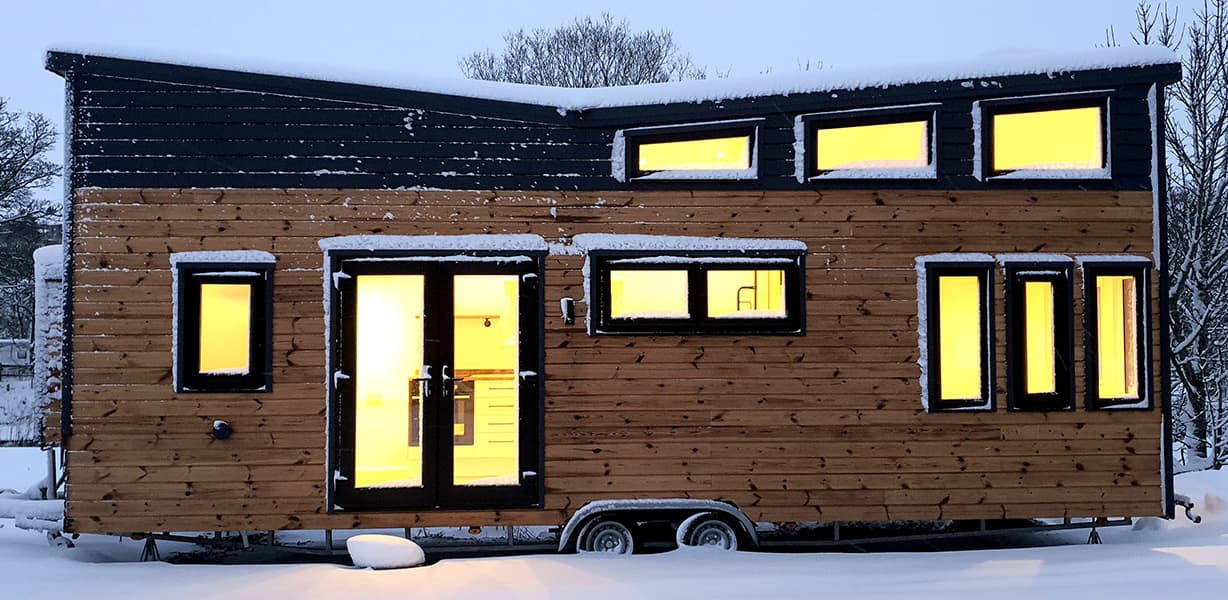
- Featured accommodation
Source: https://www.tinyecohomesuk.com
These alternative homes are designed to encourage building relationships outside their walls as well as between the household members. On the one hand, their simplicity and minimalist concept force you to go out more and focus on experiences that are far more beneficial than, for example, staring at the phone for hours each day. You get to meet more likeminded people, and that reflects on your overall quality of life. On the other hand, the time you do spend at home makes you stronger as a family or couple, as you're bound to be in each others' lives most of the time. These next two quotes nicely summarise the above points:
"Love grows best in little houses, with fewer walls to separate. Where you eat and sleep so close together, you can't help but communicate." – Doug Stone
"When you live in a tiny house, you live in such a small space that you have to get out in the world to do your living in places other than your home." – Ryan Mitchell
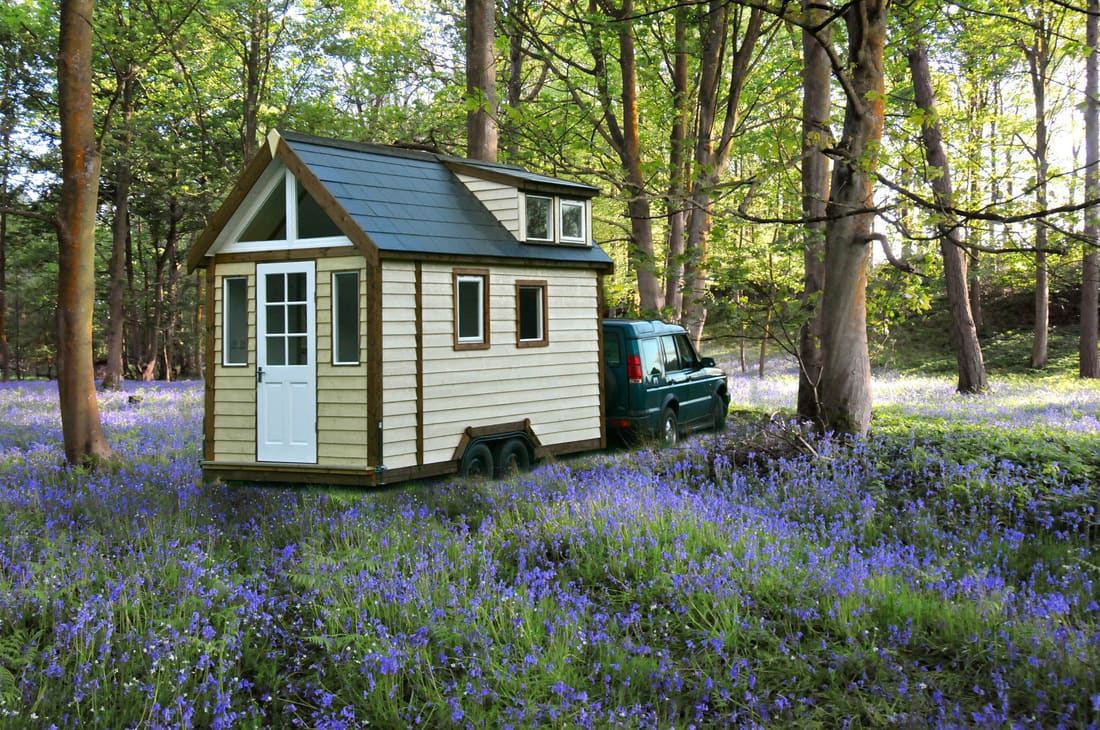
- Featured accommodation
Source: https://www.tinyhouseuk.co.uk/
There are some legalities about tiny homes which require careful consideration. Size and weight restrictions and finding land to put your tiny house are the most crucial things that need to be checked. The last can be tricky, but there is a number of places where you can legally put your tiny house in the UK. As they generally follow the same rules as caravans, you can 'park' them at campsites/caravan sites and glamping sites for holiday let purposes. Your back garden is also allowed, but only if your tiny house serves as a secondary dwelling. Farmlands are another interesting option for staying for up to 28 days (or longer under permitted development rights). If you use your tiny house for holidays or as an additional living space (meaning you have another permanent residence), you're not required to pay council tax.
Companies like Tiny ECO Homes UK, The Tiny House UK and The Tiny Housing Co are all excellent places to get your research started and learn more about this housing solution.
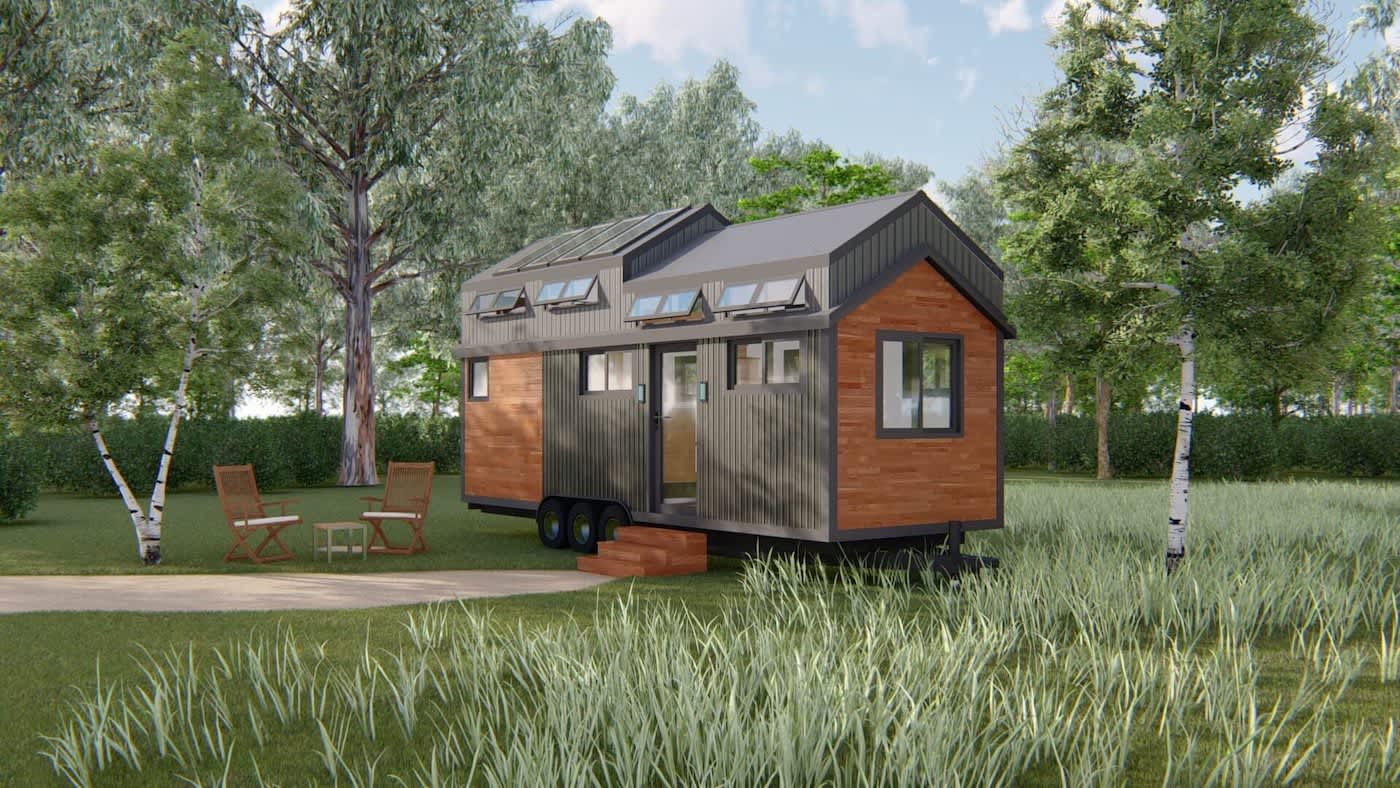
- Featured accommodation
Source: https://www.thetinyhousing.co
So, is an alternative lifestyle on wheels or waterways for you?
While there are certain upsides and downsides of living in a movable home, it's undeniable that this new wave is becoming more popular by the minute. Van life, boat life and tiny house living may not be everyone's cup of tea, but you can think of it as a short-term quest filled with adventure, freedom and excitement, rather than a permanent solution. This lifestyle can enrich your life, teach you to be happy with little and help you get to know yourself and those close to you in otherwise unimaginable circumstances. It's a kind of lifestyle that prioritises LIFE.

